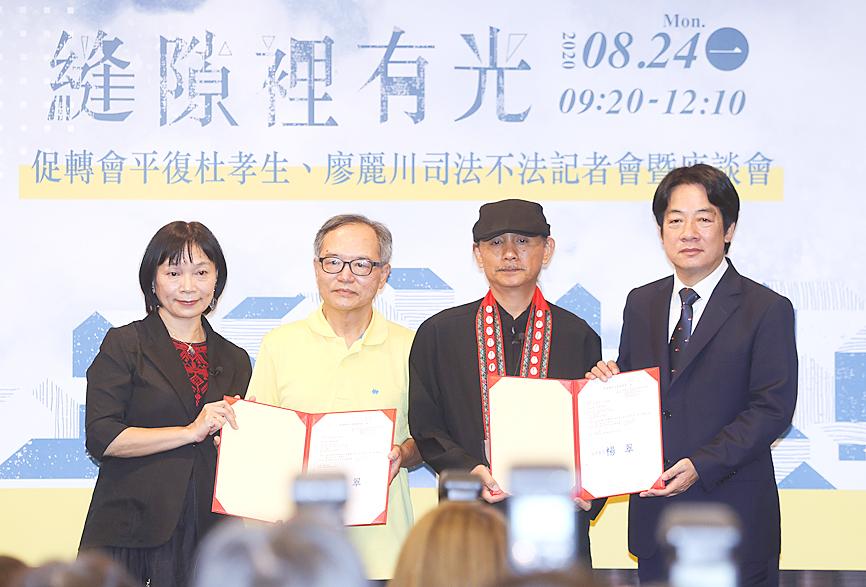The Transitional Justice Commission yesterday exonerated Voyue Tosku (杜孝生) and Liao Li-chuan (廖麗川) — two victims of political persecution during the White Terror era — at a ceremony at the Executive Yuan.
Voyue — a Tsou man who received a 17-year prison sentence in 1954 for corruption — was accused of involvement with Aboriginal leaders who were fighting for self-rule for Aborigines.
At yesterday’s ceremony, which was attended by Vice President William Lai (賴清德), Voyue’s son, Voyu Tosku (杜銘哲), said that while the number of people who lived through the White Terror era is dwindling, their voices would carry on.

Photo: Fang Pin-chao, Taipei Times
Voyu thanked the public for bringing his father’s case to a conclusion after more than 70 years.
Today’s democracy is the result of the shared experience of Taiwanese who lived through the White Terror era, he said.
Following his father’s release after four years in prison, the family was forced to relocate to Chiayi County’s Dapu Township (大埔), where they were the only Aboriginal family, Voyu said.
The move cut them off completely from the Tsou community, he said, adding that his father’s exoneration meant that his story could be told in their family’s hometown in Alishan.
Having lived outside of Alishan for more than 60 years, Voyu said he would probably not move back there, but expressed the hope that Taiwan would become a culturally diverse nation that celebrates its Aborigines.
In 1954, Voyue, who was then the head of the public health department in Alishan Township (阿里山), then called Wufeng Township (吳鳳), and Liao, head of the township office, became embroiled in a corruption case involving Tsou leaders Uyongu Yatauyanguna (湯守仁) and Uyongu’e Yatauyungana (高一生).
Voyue’s and Liao’s families were unable to seek redress and compensation through the Compensation Foundation for Improper Verdicts (財團法人戒嚴時期不當叛亂暨匪諜審判案件補償基金會), as their cases did not involve charges related to civil strife or foreign aggression, the commission said.
However, in response to requests from the two men’s sons, the commission launched an investigation into their cases and found evidence of judicial malpractice, and repealed the charges in accordance with the Act on Promoting Transitional Justice (促進轉型正義條例), it said.
The men’s trials were part of the authorities’ efforts during the White Terror era to exercise control over Alishan Township and its residents, and were a violation of their constitutional rights and freedoms, it said.
The now-defunct Taiwan Garrison Command’s interference in the cases was also a violation of the principle of a fair trial, it added.

Chinese Nationalist Party (KMT) Chairman Eric Chu (朱立倫), spokeswoman Yang Chih-yu (楊智伃) and Legislator Hsieh Lung-chieh (謝龍介) would be summoned by police for questioning for leading an illegal assembly on Thursday evening last week, Minister of the Interior Liu Shyh-fang (劉世芳) said today. The three KMT officials led an assembly outside the Taipei City Prosecutors’ Office, a restricted area where public assembly is not allowed, protesting the questioning of several KMT staff and searches of KMT headquarters and offices in a recall petition forgery case. Chu, Yang and Hsieh are all suspected of contravening the Assembly and Parade Act (集會遊行法) by holding

PRAISE: Japanese visitor Takashi Kubota said the Taiwanese temple architecture images showcased in the AI Art Gallery were the most impressive displays he saw Taiwan does not have an official pavilion at the World Expo in Osaka, Japan, because of its diplomatic predicament, but the government-backed Tech World pavilion is drawing interest with its unique recreations of works by Taiwanese artists. The pavilion features an artificial intelligence (AI)-based art gallery showcasing works of famous Taiwanese artists from the Japanese colonial period using innovative technologies. Among its main simulated displays are Eastern gouache paintings by Chen Chin (陳進), Lin Yu-shan (林玉山) and Kuo Hsueh-hu (郭雪湖), who were the three young Taiwanese painters selected for the East Asian Painting exhibition in 1927. Gouache is a water-based

Taiwan would welcome the return of Honduras as a diplomatic ally if its next president decides to make such a move, Minister of Foreign Affairs Lin Chia-lung (林佳龍) said yesterday. “Of course, we would welcome Honduras if they want to restore diplomatic ties with Taiwan after their elections,” Lin said at a meeting of the legislature’s Foreign Affairs and National Defense Committee, when asked to comment on statements made by two of the three Honduran presidential candidates during the presidential campaign in the Central American country. Taiwan is paying close attention to the region as a whole in the wake of a

OFF-TARGET: More than 30,000 participants were expected to take part in the Games next month, but only 6,550 foreign and 19,400 Taiwanese athletes have registered Taipei city councilors yesterday blasted the organizers of next month’s World Masters Games over sudden timetable and venue changes, which they said have caused thousands of participants to back out of the international sporting event, among other organizational issues. They also cited visa delays and political interference by China as reasons many foreign athletes are requesting refunds for the event, to be held from May 17 to 30. Jointly organized by the Taipei and New Taipei City governments, the games have been rocked by numerous controversies since preparations began in 2020. Taipei City Councilor Lin Yen-feng (林延鳳) said yesterday that new measures by